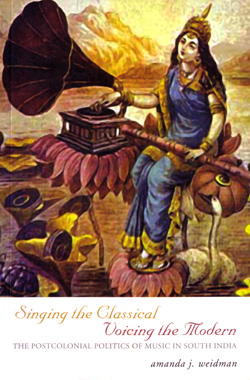Singing the Classical, Voicing the Modern
The Postcolonial Politics
of Music in South India
Amanda J. Weidman
6 x 9 inches, xiii + 347 pp. 2007
ISBN : 9788170463191
Rs 625.00 (PB)
$0.00 (PB)
£0.00 (PB)
While Karnatic music, a form of Indian music based on the melodic principles of raga and time cycles called tala, is known today as South India’s classical music, its status as 'classical' is an early twentieth-century cosntruct, one that emerged in the crucible of colonial modernity, nationalist ideology, and South Asian regional politics. As Amanda J. Weidman demonstrates, in order for Karnatic music to be considered classical music, it needed to be modeled on Western classical music, with its system of notation, composers, compositions, conservatories, and concerts. At the same time, it needed to remain distinctively Indian. Weidman argues that the contradictory imperatives led to the emergence of a particular 'politics of voice,' in which the voice came to stand for authenticity and Indianness.
Combining ethnographic observation derived from her experience as a student and performer of South Indian music with close readings of archival materials, Weidman traces the emergence of this politics of voice through compelling analyses of the relationship between vocal sound and instrumental imitation, conventions of performance and staging, the status of women as performers, debates about language and music, and the relationship between oral tradition and technologies of printing and sound reproduction. Through her sustained exploration of the way 'voice' is elaborated as a trope of modern subjectivity, national identity, and cultural authenticity, Weidman provides a model for thinking about the voice in anthropological and historical terms. In so doing, she shows that modernity is characterized as much by particular ideas about orality, aurality, and the voice as it is by regimes of visuality.
'Amanda J. Weidman brilliantly turns the tables on ideologies of voice in challenging us to envision music as constituting technologies for producing voice. Ethno-musicology, anthropology, postcolonial studies, and critical histories of techno-logy all take a step forward as a geneology of Indian "classical" music engenders new insights into colonialism, nationalism, gender, traditionality, and modernity.' —Charles R. Briggs, Professor of Anthropology, University of California, Berkeley.
Amanda J. Weidman
South Asian Studies
Music
Culture Studies
Anthropology

 Buy (PB)
Buy (PB)